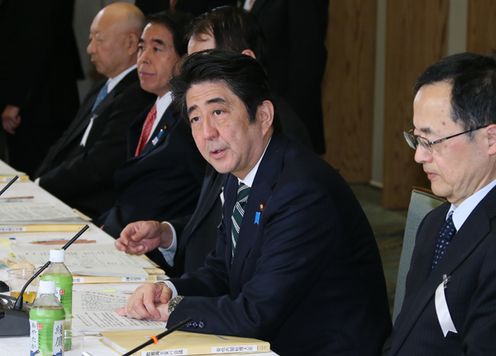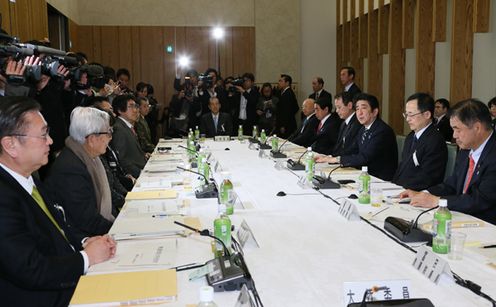Home > News > The Prime Minister in Action > January 2014 > Education Rebuilding Implementation Council
Education Rebuilding Implementation Council
Thursday, January 16, 2014

Photograph of the Prime Minister delivering an address (1)

Photograph of the Prime Minister delivering an address (2)
Prime Minister Shinzo Abe held the 16th meeting of the Education Rebuilding Implementation Council at the Prime Minister's Office.
During the meeting, discussion took place on "the future of the education system."
The Prime Minister said in his opening address,
"I would like to offer some remarks upon the opening of the 16th meeting of the Education Rebuilding Implementation Council.
Today is the first Council meeting of this year. Last year, everyone worked hard and compiled four proposals.
Following the compilation of these proposals, there has been great progress in terms of actions for educational rebuilding, including the establishment of bullying countermeasures as legal regulations, the preparation of a draft proposal for the reform of the system of the board of education, the reform of university governance and moral education, and considerations of measures to reform and enhance English education.
I would like to again express my gratitude to all of the Council members, and request your continued cooperation for holding discussions in this Council, which is entering its second year.
In 2006, the first Abe Cabinet revised the Basic Act on Education for the first time in about 60 years, stipulating the basic principles for education in a new era. We also considered the possibility of extending the compulsory education period, and eliminated the stipulation of 'nine years,' leaving the matter up to the School Education Act.
We have maintained the basic model of Japan's education system since its introduction directly after World War II. I believe that the time has come to reexamine the model, including whether it matches the developmental stages of children, and whether it is able to flexibly respond to the abilities and individuality of children.
At the same time, we also need to carry out careful and in-depth discussions from a wide range of angles on the reform of this system, which has taken hold in Japan over many years.
Today, we have just heard an explanation about children's development. I hope to further deepen discussion on the future of the education system and I would like to ask for your continued support."

